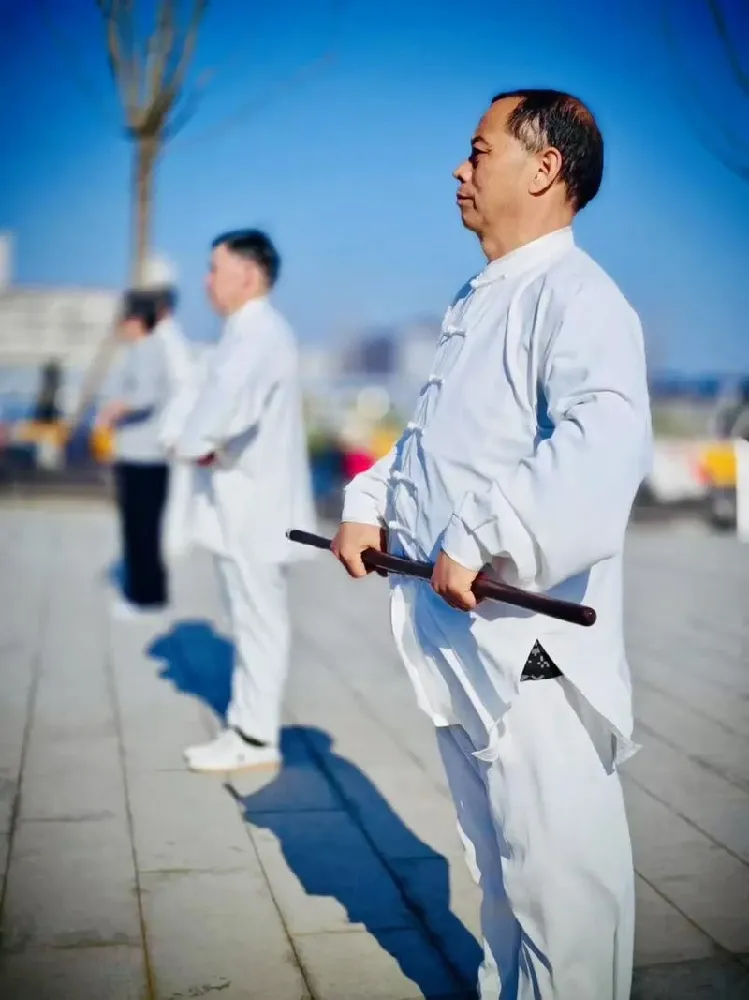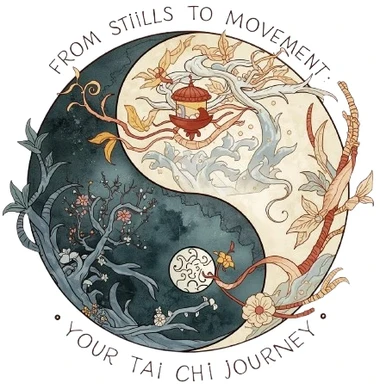Unlocking a Common Confusion
You’ve seen the slow, graceful movements. You’ve heard about the health benefits.
But when it comes to choosing between Tai Chi and Qi Gong, the line seems blurry. Are they the same thing?
If you’ve ever typed “Tai Chi vs Qi Gong” into a search bar and ended up more confused than before, you’re not alone.
Even seasoned practitioners sometimes mix them up. And that’s okay.
Both practices come from ancient Chinese traditions. Both involve breath, movement, and energy.
But they’re not interchangeable—and understanding the difference between Tai Chi and Qi Gong can help you choose the path that fits your body, your goals, and your lifestyle.
This guide is your compass. I’ll walk you through the key distinctions, using simple metaphors and real-life examples.
By the end, you’ll know exactly what each practice offers—and which one might be your perfect match.

One Sentence, One Metaphor
Let’s start with a visual.
- Qi Gong is like building with blocks. Each exercise is a standalone piece, designed to target a specific function—boosting lung capacity, calming the nervous system, or strengthening the kidneys. You can practice one, or stack several together. It’s modular, flexible, and often very gentle.
- Tai Chi is like performing a flowing dance. It’s a choreographed sequence of movements called a “form,” where each posture connects to the next. You’re not just doing isolated exercises—you’re learning how to move through space with balance, grace, and intention.
Here’s the key connection: Tai Chi includes Qi Gong, but Qi Gong doesn’t require Tai Chi. Every Tai Chi practitioner is doing Qi Gong (they’re cultivating energy), but not every Qi Gong practitioner is doing Tai Chi.
Think of Qi Gong as the foundation. Tai Chi builds on it, adding structure, philosophy, and martial elements.
Deep Dive: Tai Chi vs Qi Gong at a Glance
Let’s break it down. Here’s a clear comparison to help you see the difference between Tai Chi and Qi Gong in practice:
| Feature | Qi Gong | Tai Chi |
|---|---|---|
| Main Focus | Cultivating internal energy (Qi) | Meditation in motion, with martial roots |
| Structure | Individual exercises, often repeated | Continuous flowing form with coordinated steps |
| Learning Curve | Easier to learn, less choreography | More complex, requires memorizing sequences |
| Physical Intensity | Gentle, often stationary | Moderate, includes stepping and weight shifting |
| Best For | Quick relaxation, energy boost, recovery | Improving balance, coordination, and mental focus |
| Philosophy | Health and healing | Harmony, philosophy, and martial application |
Exclusive Tip: If you’re short on time or recovering from illness, Qi Gong is like a “movement snack.” If you want a full-body experience with rhythm and challenge, Tai Chi is your meal.
Philosophy and Purpose: Subtle but Significant
Both Tai Chi and Qi Gong are rooted in Chinese medicine and Taoist thought. But their intentions diverge.
- Qi Gong is primarily about health. It’s designed to open energy channels (meridians), balance your internal systems, and promote healing. Many Qi Gong routines are tailored to specific organs or emotional states. You might practice “Lung Qi Gong” to improve breathing or “Heart Qi Gong” to ease anxiety.
- Tai Chi, while also healing, goes deeper into integration. It combines intention (yi), energy (qi), and form (xing) into a single practice. It’s not just about feeling better—it’s about moving through life with awareness, softness, and strength.
Tai Chi also includes martial applications. Even if you’re not interested in self-defense, the principles—like yielding, redirecting force, and staying grounded—apply to everyday challenges.
Imagine this: Qi Gong is like tuning your instrument. Tai Chi is playing the music.

Which Should You Choose? A Simple Decision Guide
Let’s make this practical. Here are three common scenarios and how to decide:
You’re recovering from illness or feeling overwhelmed
Start with Qi Gong. It’s gentle, adaptable, and often practiced standing still. You’ll feel results quickly—better sleep, calmer mood, and more energy.
You want a challenge and enjoy learning sequences
Go for Tai Chi. It improves memory, coordination, and balance. The forms may take time to learn, but they offer a deep sense of accomplishment.
You’re curious about both
Great news—you don’t have to choose! Many practitioners use Qi Gong as a warm-up or supplement to Tai Chi. They complement each other beautifully.
Exclusive Tip: Try a week of Qi Gong in the morning and Tai Chi in the evening. Notice how your body responds. Let your experience guide you.
Busting the Myths: What Tai Chi and Qi Gong Are Not
Let’s clear up a few lingering misconceptions:
- They’re not religious. While rooted in Taoist philosophy, both practices are secular and accessible to everyone.
- They’re not just for seniors. People of all ages benefit—from teens dealing with anxiety to professionals seeking focus.
- They’re not passive. These are active, intentional practices. You’re not just waving your arms—you’re cultivating awareness, strength, and energy.
- They’re not interchangeable. Qi Gong and Tai Chi serve different purposes. Knowing the difference helps you choose wisely.
Imagine this: You wouldn’t compare yoga to Pilates and expect one to “win.” They’re different tools for different goals. Same with Tai Chi and Qi Gong.
Conclusion: There’s No Wrong Door
So—Tai Chi vs Qi Gong. Which is better?
Here’s the truth: there’s no wrong choice. Both are beautiful, healing, and transformative. The real question is: what do you need right now?
If you’re looking for simplicity, energy, and quick relief—Qi Gong is your doorway. If you’re drawn to rhythm, challenge, and philosophical depth—Tai Chi is your path. And if you’re curious about both? You’re in luck. They complement each other perfectly.
- Still not sure? Take our 2-minute quiz to discover whether Tai Chi or Qi Gong is the perfect fit for your goals and lifestyle.
- Ready to try Qi Gong? Explore our 5-Minute Morning Qi Gong Routine for instant energy and calm.
- Want to dive into Tai Chi? Start with our Beginner-Friendly Tai Chi Lesson—no experience needed.
Your journey begins with a breath.
Let it guide you. Start Your Tai Chi Journey Here.
Frequently Asked Questions: Clearing Up the Details
Is Tai Chi a form of Qi Gong?
Yes—sort of. From a broad perspective, Tai Chi is a structured form of Qi Gong. Both cultivate internal energy (Qi), but Tai Chi adds martial principles, movement sequences, and philosophical depth. Think of Qi Gong as the root system and Tai Chi as the flowering tree.
Which is better for stress relief: Tai Chi or Qi Gong?
Both are excellent. Qi Gong often delivers faster results because it’s simpler and more direct. Tai Chi, with its flowing forms, offers a deeper meditative experience over time. If you’re feeling overwhelmed, start with Qi Gong. If you want to build long-term resilience, Tai Chi is your friend.
Can I lose weight with either practice?
While neither is designed for weight loss, both support it indirectly. They improve circulation, posture, and digestion. More importantly, they reduce stress—which can help regulate appetite and sleep. Combine either with mindful eating and walking, and you’ll see results.
Is Tai Chi or Qi Gong better for arthritis?
Both are gentle and joint-friendly. Qi Gong often involves less movement, making it ideal for flare-ups or limited mobility. Tai Chi improves range of motion and balance, which helps prevent falls. Many arthritis programs include both.
Can I do Qi Gong and Tai Chi together?
Absolutely. In fact, many practitioners use Qi Gong to warm up before Tai Chi. Qi Gong builds internal awareness; Tai Chi channels it into movement. They’re like breath and body—better together.
What’s the main difference between Tai Chi and Qi Gong?
Tai Chi is a flowing sequence of movements with martial roots, while Qi Gong consists of standalone exercises focused on energy cultivation. If you’re looking for structure and movement, Tai Chi is ideal. If you prefer simplicity and targeted healing, Qi Gong may be better.
What is Qi Gong, and how does it work?
Qi Gong is a Chinese practice that combines breath, posture, and intention to regulate your internal energy (Qi). It’s often used for healing, stress relief, and emotional balance. Many routines are short and easy to learn, making Qi Gong for beginners a great entry point.
Is Tai Chi a form of Qi Gong?
Yes, in a broad sense. Tai Chi includes Qi Gong principles like breath control and energy flow, but adds martial techniques and choreographed forms. So while all Tai Chi involves Qi Gong, not all Qi Gong involves Tai Chi.
Which is better for arthritis: Tai Chi or Qi Gong?
Both are gentle and joint-friendly. Tai Chi for arthritis vs Qi Gong depends on your mobility. Qi Gong is often more stationary and easier during flare-ups, while Tai Chi improves balance and coordination over time.
Can I combine Qi Gong exercises with Tai Chi practice?
Absolutely. Many practitioners use Qi Gong exercises to warm up before Tai Chi. Qi Gong builds internal awareness, while Tai Chi channels it into movement. Together, they offer a complete mind-body experience.
